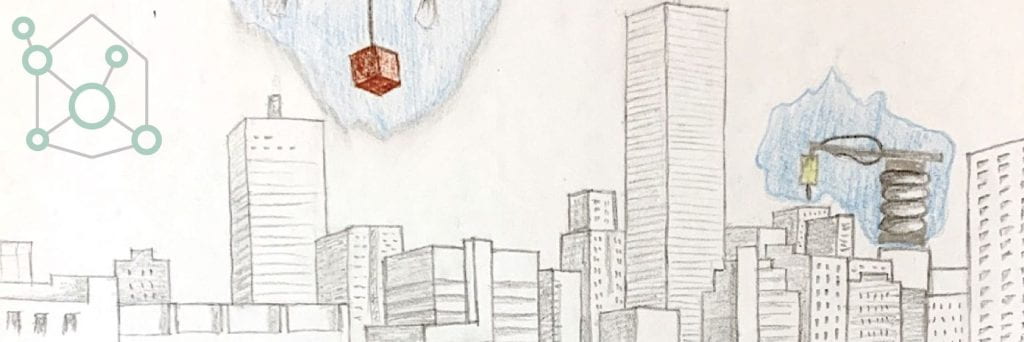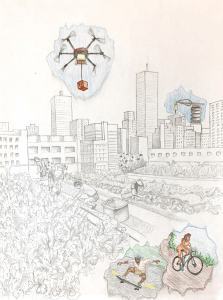
Sketch by: Sofia Katona
Reclaiming spaces and turning them into urban farms is supporting local food production beyond the city with new innovative technologies, creating short distance delivery of produce and promoting healthy living while also addressing food deserts more pervasively throughout the city. The establishment of living labs inspires experimentation with a variety of different food sources and methodologies. It stretches our understanding of what can be considered edible and creates alternative nutritional sources unique to the local environment.
Incubators work at the forefront of developing new scalable solutions to societal problems such as pandemics and climate change destined to replace outdated systems with sustainable solutions utilizing raw and renewable resources. Blocks and urban neighborhoods are networked to share such resources and generate them for each other creating a cyclical economy while also actively contributing to global knowledge sharing and collaboration.
This can be observed in several areas:
GREEN MINDSET
People are mindful about what and how much they consume and how and where it is being produced. The 2020 pandemic has brought into focus, how vulnerable supply chains are, how we are globally connected and that our immediate environment is precious and requires protection.
FOOD EXPERIMENTATION

Source: Dezeen.com | Elzelinde van Doleweerd
https://bit.ly/3kfApBI
HUMAN-POWERED TRANSPORTATION
An active lifestyle is the focus within car-free cities and exclusively powered by humans such as walking, biking, scooting, skateboarding, and kayaking. Every citizen receives a universal code that can unlock any mobility device from docking stations. Each device also stores the energy created through manpower and converts it to energy at docking stations, returning it back to the city. Citizens can also choose virtual reality glasses that map out our route in front of them, making it easier to exercise and travel hands-free. These glasses also monitor speed, heart rate, and distance traveled, which can earn you credits to be used in local stores as a currency.
REVERSE HEALTHCARE
Doctors’ offices and hospitals report a decrease in obesity and other diseases. Since environmental factors, work structures, and the built environment have improved, the healthcare system works with a reverse set up where doctors are paid for keeping their patients healthy rather than just treating illnesses. Different schools of thought co-exist and mental health care is completely integrated with regular treatments.
ENTREPRENEURIAL SUSTAINABILITY
Sustainability is front and center across different industries and cities are developing goods such as clothing with locally sourced materials as much as possible. Processes are being simplified allowing individuals to do it themselves and dramatically drop the need for factories. Automation and robotics have enhanced delivery mechanisms connecting these suppliers directly with the customer from delivery drones to robots to pick up stations available on every street corner.
LOCAL GOES GLOBAL AND REVERSE
The development of sustainable solutions is depending on a variety of formal and informal, local as well as geopolitical agendas and interests. Countries across the world have agreed that their cities and governments partner with private enterprises, non-profit organizations and individual citizens rather than imposing top-down solutions. The government supports privately led sustainability efforts through grants and funding to encourage utilization and scalability on a systemic level through knowledge exchanges on a global scale. Companies and citizens are protected from any liability, which ensures that services and innovation can be developed and iterated to benefit society more rapidly.
EDIBLE BUILDING MATERIALS
All buildings have already been converted to being sustainable, net zero, and outfitted with solar panels, harvesting wind or water energy. Active testing of new energy sources and building materials is at the heart of promoting sustainable living concepts. New developments are now built as passive neighborhoods and constructed only with recycled or biodegradable materials, which has led citizens to experiment within local labs and develop new testing environments for materials.
COMMUNITY SERVICE FOR ALL
 Every two months the community comes together to clean the public spaces of the city. From landscaping and maintaining green spaces to picking up trash it is expected that every citizen contributes and thus identifies with their living environment. There is a broad system of services people can provide for the community, all of which encourage getting to know each other and to collaborate.
Every two months the community comes together to clean the public spaces of the city. From landscaping and maintaining green spaces to picking up trash it is expected that every citizen contributes and thus identifies with their living environment. There is a broad system of services people can provide for the community, all of which encourage getting to know each other and to collaborate.
SOCIAL IMPACT EDUCATION
Universities and colleges are offering hybrid and remote options as a standard practice. City and middle spaces serve as an opportunity to congregate and collaborate in person on projects on real local challenges and with local organizations. University campuses are decentralized and offer classrooms everywhere. K-12 schools remain localized and also offer hybrid options to shift towards a more meaningful applied learning model with project-based education tackling local challenges for civic and social impact rather than simply delivering knowledge. Higher Education is made available for all at no or very low cost.
